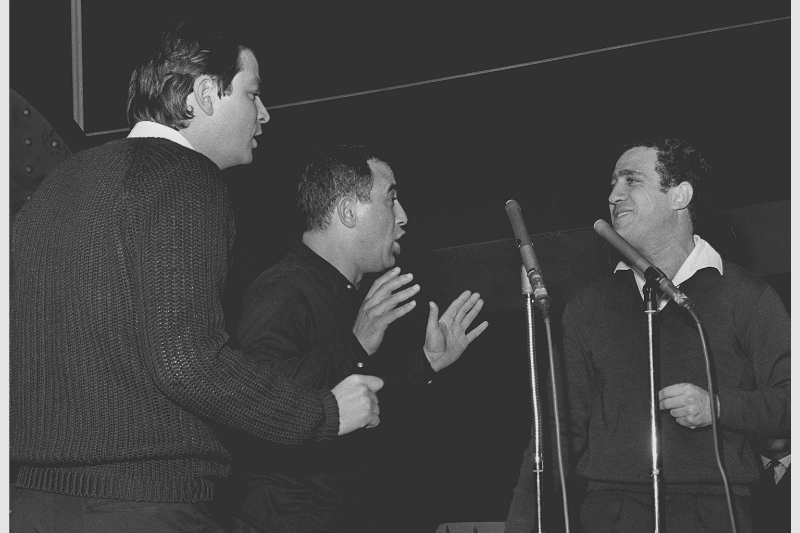Donald Trump and Bibi Netanyahu are corrupt, bigoted politicians, and they will not solve the Israeli-Palestinian conflict. Neither, it seems, will Mahmoud Abbas, too old and unpopular. In these moments when peace feels so distant, I let my mind wander towards a broader perspective, an imagined future beyond Israel and Palestine. I think of the larger Middle East, and the peoples who live there, Muslims, Christians, and Jews. This larger framework reminds me of a song my mother used to sing to me when I was a child.
My mom grew up attending Shomria, a socialist Zionist summer camp in northern Ontario. They had quaint, hilarious rituals like “capitalist day,” when campers would be required to pay money to enter the cafeteria or go to the bathroom, to demonstrate the evils of capitalism. One thing Shomria encouraged was singing. My mom learned “The Internationale,” a left-wing anthem, in English and Hebrew, as well as Italian revolutionary songs like “Avanti Popolo.”
The song that resonates most with me, however, is “K’she Yavo Shalom,” which is sung to the tune of “When the Saints Go Marching In.” The song was first performed in the early 1960s by the Yarkon Bridge Trio, an Israeli folk group consisting of famous Ashkenazic musician Arik Einstein and celebrated Sephardic singer Yehoram Gaon, along with Benny Amdursky.
The Hebrew lyrics, which were written by Polish-born Israeli Haim Hefer, tell of a better time, a fairy tale. Theodor Herzl, the father of modern Zionism, proclaimed that, “If you wish it, it is no fairy tale,” which is more commonly translated as, “If you will it, it is no dream.” That dream of Middle East peace seems very distant today. Nonetheless, it’s worth singing this song to learn the contours of that dream.
The song’s title, “K’she Yavo Shalom,” translates to “When Peace Comes.” That line is repeated, with each stanza offering a different example of what will happen when there is peace. The lyrics imagine a fantastic world in which an Israeli Jew could “take a train to Damascus” or “go skiing in Lebanon.” Each stanza offers a new possibility. The singers describe the “sons of Baghdad being healed (at the hot springs) in Tiberias.” They anticipate people celebrating and “raising a glass in Cairo and in Haifa.”
In some sense, the song is a product of its time. In the early ’60s, before the 1967 Six-Day War and the military occupation of the West Bank and Gaza Strip, people referred to the Arab-Israeli conflict more than the Israeli-Palestinian one.
READ:WEINFELD: HALLMARK’S HANUKKAH MOVIES AREN’T ANTI-SEMITIC
Jewish Israelis worried more about foreign threats than domestic ones. Israel’s political and military establishment focused on neighbouring enemies like Egypt, Syria, Jordan and Lebanon, or hostile Arab states like Iraq.
Yet the song hearkens back to earlier ideas of potentially viable Mideast political frameworks. In 1918, American philosopher Horace Kallen, a passionate secular Zionist, desired a “United States of Asia Minor, involving the Jews, Arabs, Armenians, etc., under international or British guarantee.” For Kallen, and many other early Zionists, what mattered was Jewish safety, cultural development and a connection to the Land of Israel, coupled with goodwill towards all the people who inhabited the region.
Today, the geopolitical reality is different, but the region remains mired in conflict. Perhaps what is needed is not a United States of Asia Minor, but something closer to the Canadian model. The Middle East is multicultural, with different religions, languages, literature, art, sports, songs, food and philosophies. But the people who create and blend these cultures are indelibly linked through their beautiful, complex histories, their interwoven pasts and presents.
So let’s imagine the Middle East at its most utopian, with Jews, Muslims and Christians traveling to Damascus, skiing in Lebanon, bathing in Tiberias and raising glasses in Haifa and Cairo. Let’s translate the song into Arabic and add verses in Farsi about Iran. And let’s sing all our versions together in harmony.







